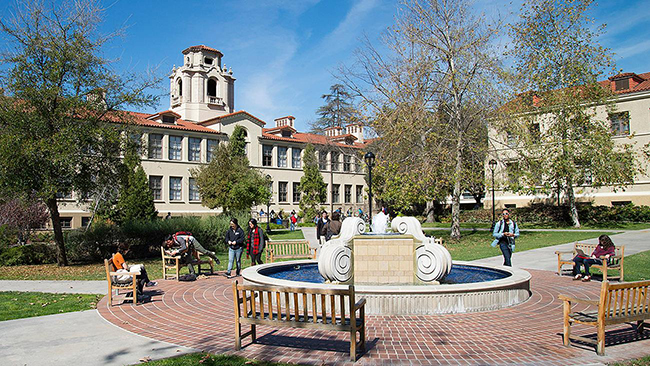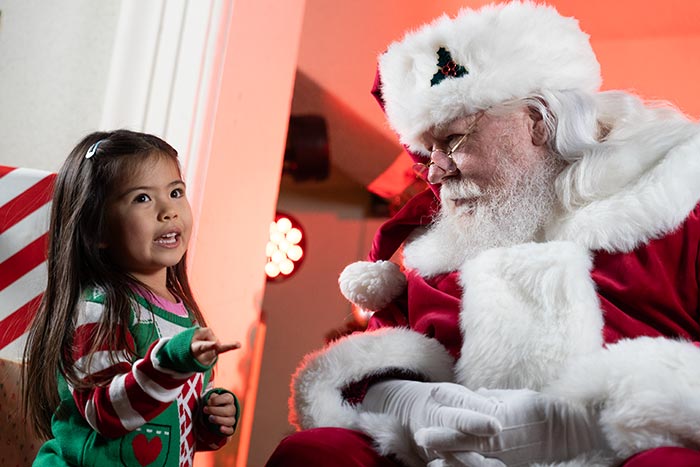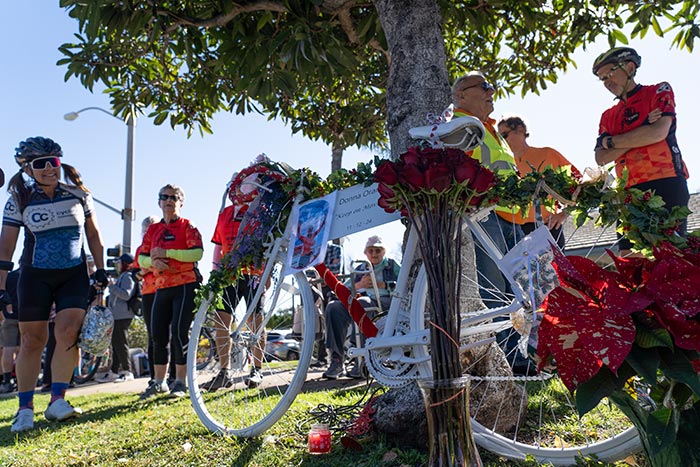How much religion is too much at Claremont city events?
Claremont’s policy on event requests was called into question this week after a complaint alleging the misleading billing of a patriotic concert held at the Claremont Depot last Sunday.
The star-spangled recital, which promised a variety of musical tunes reminiscent of the American forefathers, left a sour note for some who felt the inordinately Christian tone was exclusive and its original billing misrepresented. Members of the Community and Human Services Commission who were present at the concert raised the issue because their approval was given with the assurance that the recital would be strictly patriotic in nature with the exception of an occasional reference to God in some of the songs.
“It puts the commission in a bad light, and I don’t think we deserve that,” said Commissioner Maury Feingold. “The commission asked all the right questions.”
The debate over the appropriate balance to strike in the private use of public space has long been a sticky issue for municipalities and organizations across America, with representatives attempting to grant the freedoms of the First Amendment while also honoring the Constitution’s Establishment Clause.
As it stands, the city of Claremont’s policy does not restrict the use of public space by religious organizations. In addition, the city did not sponsor the event in any way, and event organizers at Pomona First Baptist paid for the use of the public space.
“Their usage fell within our policy,” said City Manager Tony Ramos.
The event was presented to and approved by the city with the understanding that it was a largely secular event. However, given the tenor of the performance, residents have since raised concern over whether or not the city should have stricter policies put into place.
The Community and Human Services Commission approved the event on June 6, under the grounds that the event would be “patriotic in nature.” Given the late timing of the request, event approval was sent directly to the commission instead of the usual task force or ad hoc committee for review, according to Melissa Vollaro, community and human services manager.
Commissioner Bob Miletich was the first to question if the event would strictly consist of patriotic music. In response to his question, the commissioners were told yes. The event coordinator had provided the city with a draft of the program, which was then reviewed by staff.
“We did verify that it is musical and patriotic in nature,” Ms. Vollaro confirmed with the commissioners.
Before the final vote, Commissioner Andy Winnick again asked if the event would be presented solely as a patriotic concert. Mr. Winnick stated he had no problem with patriotic music and recognized the presence religion may play in some of those songs. However, it was the possibility of further religious discussion that concerned him.
“If we got into a discussion from the platform that was much more religious than patriotic in nature, then it would bother me,” Mr. Winnick said at the meeting. “I just want reassurance that there is no ‘service’ conducted as a part of this. It is a concert strictly.”
The commissioners were assured that the concert would not include a service. With that, the commission unanimously approved the concert with one abstention.
“It sounds like a wonderful idea,” Ms. Feingold said that evening. “A great way to kick off the Fourth of July week.”
However, Ms. Feingold’s excitement changed just minutes into Sunday’s program when she saw the Christian Nations flag presented for salute along with the American flag while the Christian Nations song was sung to the tune of the National Anthem.
“It was a church service written around a patriotic theme,” said her husband Jerry Feingold.
Peter Torry, Pomona First Baptist’s executive pastor, said he was conscious of the sentiment, but asserted that nothing in the program was meant to offend or proclaim one religion over another. He says the script in its entirety, lyrics and narration, were handed over to the city with the event application.
“If the city felt that [excessive religion] was in the script, it certainly would have been taken out,” Mr. Torry said. “We did everything that we needed to do. If the commission had wanted to ask us further questions, we were all there until the vote was complete.”
Mr. Torry said he did not come forward during the commission review to answer questions that were not specifically addressed to him because he was unaware of the commission’s policy.
“Our program fit within the context of the city’s policy,” Mr. Torry said, adding, “Our program isn’t designed to offend anyone. If we wanted to hide something we wouldn’t have given the city our script.”
Though the program was not what the commission thought it would be, Commission Chair Robin Gottuso does not believe the the program was intentionally misrepresented.
“From the perspective of Pomona First Baptist, it was very patriotic,” Ms. Gottuso recognized. “But when it’s a private event, I don’t think we as a city have the right to dictate content of the event. There are review channels when special requests come through, and it gets reviewed, but when we start dictating content of a special event, then that’s when I think we are crossing the line. They had a right to rent out a space and do what they did.”
The patriotic musical is the second event in recent weeks with religious ties sparking debate over the appropriateness of religious events held in public spaces. Controversy was incited last month because of a recommendation for Claremont to co-sponsor an event at El Barrio Park that included a Catholic mass. After giving a positive recommendation to the council regarding the El Barrio celebration, the commission was more careful in lending its approval to the patriotic event led by a religious organization as a result. A similar controversy followed the city’s decision to rename its Easter egg hunt to “spring celebration.”
Navigating such waters is “a sticky issue,” but not doing so can lead to a “a slippery slope” for the city, acknowledged Commissioner Butch Henderson, who also serves as a member of the Claremont Interfaith Council. Mr. Henderson said that he was troubled over the commission’s approval of the mass at El Barrio Park, and remained troubled with approval of the patriotic concert. He upholds that the city ought to refrain from sponsoring religious activities.
“It’s not the business of the government to sponsor any form of religious activity or prohibit it,” he said.
Mr. Henderson believes the Claremont City Council should have opted to establish a specific policy rejecting city sponsorship of any event with a religious component. The decision to adopt such a policy was rejected in late June.
“It leaves us in foggy land,” Mr. Henderson said. “There needs to be a clearer policy. Otherwise, as soon as one thing gets approval, the door gets opened for others.”
It’s not an issue of being politically correct, but being constitutionally correct, according to Mr. Henderson.
“I am empathetic with those who don’t want to see our society totally secularized, but the way to prevent total secularization is not through enforcing one secular point of view or another,” Mr. Henderson said. “In fact, the way to guard against secularization of our society is to allow all religions to flourish, which is the genius of our country.”
—Beth Hartnett










0 Comments